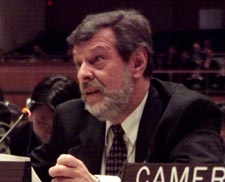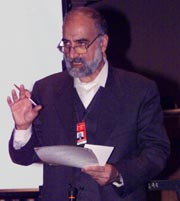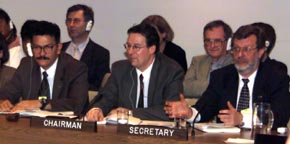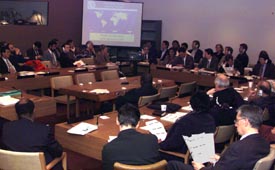 NIGERIA, speaking for the G-77/CHINA, said any IAM should be
comprehensive, holistic and inclusive of all issues relating to
forests. He stressed that an IAM should specifically address technology
transfer and focus on major issues that undermine SFM, such as inadequate
financial resources and lack of market access for goods from developing
countries. He supported an action-oriented, permanent dialogue and
provision of new and additional financial resources
NIGERIA, speaking for the G-77/CHINA, said any IAM should be
comprehensive, holistic and inclusive of all issues relating to
forests. He stressed that an IAM should specifically address technology
transfer and focus on major issues that undermine SFM, such as inadequate
financial resources and lack of market access for goods from developing
countries. He supported an action-oriented, permanent dialogue and
provision of new and additional financial resources
|
 PORTUGAL, on behalf of the EU, supported an institutionalized
and permanent arrangement, which is action-oriented and focused
on implementation and monitoring. He said that although the EU has
supported a LBI, it remains open-minded to the form of a future
arrangement. He said the CSD must be presented with a concrete recommendation
with a strict timetable for implementation.
PORTUGAL, on behalf of the EU, supported an institutionalized
and permanent arrangement, which is action-oriented and focused
on implementation and monitoring. He said that although the EU has
supported a LBI, it remains open-minded to the form of a future
arrangement. He said the CSD must be presented with a concrete recommendation
with a strict timetable for implementation.
|
|
|
<< While stating that a LBI is necessary in the long-term, COSTA
RICA acknowledged the lack of political support for such a mechanism
and thus advocated a transitional arrangement. He proposed establishing
an under secretary-general on forests to, inter alia, guarantee
an ongoing dialogue, establish necessary coordination mechanisms,
create a special intergovernmental commission to identify the scope
of a LBI and establish a forest fund. |
|
CANADA expressed support for negotiating a framework convention
on forests or a LBI. He remarked that a forest convention would
ensure sustained partnership, political commitment, policy development,
implementation and compliance, and said commitments would be balanced
with the provision of technology transfer and funding for implementation.
He said Canada would submit a draft resolution for the CSD >>
|
 |
|
|
<<
AUSTRALIA proposed a non-binding, permanent arrangement that would
include: a multi-year work programme to implement SFM; a transparent
forum to provide assessment on progress; funding and administrative
arrangements similar to those of the IPF and IFF; coordination of
forest-related work of international organizations; promotion of regional
initiatives; continuation of policy dialogue; facilitation of trade
and market access; and continued work on certification and labeling,
consistent with WTO obligations. |
|
The RUSSIAN
FEDERATION (on the left) supported a LBI and emphasized the
need to establish problem-solving arrangements. He said failure
to reach agreement at IFF-4 might permanently compromise the international
forest dialogue >>
The REPUBLIC OF KOREA (right) noted the lack of time to merge
divergent views and therefore said the IFF should formulate the
basic functions and modalities of the future IAM but not commit
to a particular IAM before CSD-8 >>
|
 |
 International Alliance of Indigenous peoples of Tropical Forests
underscored the importance of recognizing and strengthening indigenous
peoples' rights to land, language, identity and culture by preserving
and protecting forests. He warned there would be no future for forests
should commercialization and exploitation continue.
International Alliance of Indigenous peoples of Tropical Forests
underscored the importance of recognizing and strengthening indigenous
peoples' rights to land, language, identity and culture by preserving
and protecting forests. He warned there would be no future for forests
should commercialization and exploitation continue. |
 GLOBAL FOREST POLICY PROJECT discouraged establishment of another
IFF and urged delegates to provide details on their IAM proposals.
GLOBAL FOREST POLICY PROJECT discouraged establishment of another
IFF and urged delegates to provide details on their IAM proposals.
|
|
 Side-event: Low Forest Cover
Countries and the Tehran Process
Side-event: Low Forest Cover
Countries and the Tehran Process
Delegates attended a lunchtime briefing on the International Meeting
of Experts on Special Needs and Requirements of Developing Countries
with Low Forest Cover and Unique Types of Forests which took place
in Tehran, Islamic Republic of Iran, from 4-8 October 1999. Dr. T.
Shamekhi, Professor of Karaj Natural Resource College at Tehran University
and Chair of the Meeting (shown here on the right), highlighted
conclusions and recommendations from the meeting. Participants had
agreed on the need to: define the term low forest cover country (LFCC);
develop policy and institutions to adequately address LFCCs; transfer
technology to LFCC countries to enable reforestation; and develop
funding for the forestry sector. The major outcome of the Expert Meeting
was the Tehran Declaration which established the Tehran Process, an
ongoing process designed to bring together LFCCs to address common
needs. |
Side-event: The Costa Rica
/ Canada Initiative |

|
A
side event on the Costa Rica/Canada Initiative (CRCI) was chaired
by Denis Chouinard Tuesday evening. He explained that more than 40
countries and organizations participated in the Initiative, whose
purpose was to consider options for and to identify elements of future
international instruments for the conservation and protection of forests.
Co-Chair Luis Rojas Bolanus made an overview of the Initiative, and
Co-Chair Jacques Carette presented the results of the10 international
meetings that involved over 600 experts. |
 He
noted that the CRCI process has improved understanding of forest-related
issues and has facilitated a frank and transparent exchange of views
and information. As a result, consensus emerged on the following
points: forest issues are not being adequately addressed; the need
for an action-oriented approach is imperative; existing instruments
have unfulfilled potential; and there is increased willingness to
consider a new legally binding instrument on forests. For more information: He
noted that the CRCI process has improved understanding of forest-related
issues and has facilitated a frank and transparent exchange of views
and information. As a result, consensus emerged on the following
points: forest issues are not being adequately addressed; the need
for an action-oriented approach is imperative; existing instruments
have unfulfilled potential; and there is increased willingness to
consider a new legally binding instrument on forests. For more information:
CRCI web site: http://www.nrcan.gc.ca/cfs/crc
Sustainable Development's Coverage of the Final meeting of the CRCI
Initiative: http://enb.iisd.org/crs/crci/final
|
In the corridors:
|
|
 While
a number of countries have maintained support for a LBI on forests,
the two principal models for an ongoing non-legally binding institution
on forests proposed by various delegations have stimulated discussion.
The model for a body under the UN General Assembly appears to receive
support from countries who want a high-level institution, but others
are concerned that such an institution would exclude input from
major groups. Others prefer an institution under the CSD, which
would be more transparent and participatory but faces concerns that
such an organization may not have high political commitment. While
a number of countries have maintained support for a LBI on forests,
the two principal models for an ongoing non-legally binding institution
on forests proposed by various delegations have stimulated discussion.
The model for a body under the UN General Assembly appears to receive
support from countries who want a high-level institution, but others
are concerned that such an institution would exclude input from
major groups. Others prefer an institution under the CSD, which
would be more transparent and participatory but faces concerns that
such an organization may not have high political commitment.
<< In the Corridors:
ENB writer Laura Ivers consulting yet another forum participant
(in this case, Bill Mankin
of the Global Forest Policy Project)
|